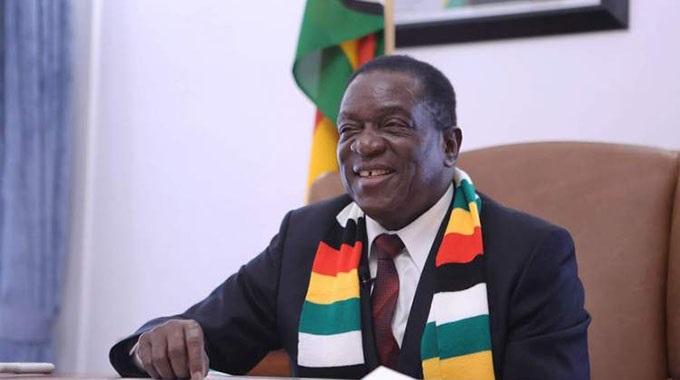Government reforming tertiary institutions

Fidelis Munyoro, Harare Bureau
PRESIDENT Emmerson Mnangagwa yesterday said Government was reforming tertiary institutions in the country to produce graduates who fit into the Second Republic’s industrialisation and modernisation matrix.
He said relevant innovative and responsive education, training and skills development should be the life blood through which the nation would succeed and prosper towards an upper middle income economy by 2030.
The President made the remarks during his acceptance speech following his installation as Zimbabwe Open University chancellor.
The installation makes him officially the second crown of the institution of higher open learning outside the conventional education system.
“I urge the Zimbabwe Open University to, therefore, adjust its organisational culture, competitive niche, degree and module structures to align with the present focus of the nation,” he said.
“I further challenge you to be bold and expand your faculties away from the traditional fields of study. Endeavour to offer programmes of the future that will propel our country’s industrialisation and modernisation agenda. No domain of study should be deemed out of your purview.”
The President hailed plans by the university to set up science laboratories and innovation incubation hubs throughout all provinces.
This, he said, should revolutionise research into science-related spheres and enhance the teaching of science.
President Mnangagwa also emphasised urgent need to address some basic challenges such as e-learning education resources for more effective learning.
“In that regard, the dependence of distance learning on information communication technology in its delivery strategies can never be overlooked,” he said.
“ZOU and other institutions of higher learning must accelerate and keep pace with the information communication revolution. The development of modern online learning platforms and applications should be prioritised.”
The President said rural and remote areas have similar educational needs to those in urban areas hence in line with devolution and the development of provincial economies, access to IT services and high-speed communication as well as internet services were now an imperative to the further democratisation of higher education.
“Internet services providers are urged to prioritise the provision of the requisite services to marginalised areas,” he said.
On its part, the President said, his Government would continuously support distance learning by facilitating the provision of modern infrastructure and the appropriate accessories.
“Together we can scale up open learning to greater heights in Zimbabwe,” he said.
President Mnangagwa said as the chancellor of the university he would ensure that the university promoted equal access to additional training, research and innovative developments. “In so doing, we must commit ourselves to quality control, standardisation and academic integrity,” he said.
He called on universities to concertedly develop conceptualised learning modules which promote local competences and incorporate relevant content in the curricula, emphasising on local educational needs and training in line with education for sustainable development.
Further, the Head of State and Government and Commander-in-Chief of the Zimbabwe Defence Forces, challenged the university to encourage scholarly groups and nurture students who are both academically talented and responsible citizens.
“They must be agents for scientific thinking and innovation as well as the bedrock of new business models,” he said. “Our graduands must have a mindset shift to become providers of solutions than mere beneficiaries of outcomes.”
In his congratulatory message to the graduates, President Mnangagwa reminded them that the skills and competencies they have acquired were not only critical to their career paths, but more importantly should be building blocks in the development of the country. ZOU acting vice-chancellor, Professor Francis Mugabe said like any nation, the challenges facing Zimbabwe were unique to her hence they needed a multi-prolonged approach.
This, he said, was the reason why since the start of 2018, ZOU had expanded the faculties so that its curriculum educated a complete student and produce a graduate of a wide cognitive perspective.
“We now have eight faculties and their goal is to produce industrialists, economists, technicians and humanists with hard and soft skills and they are guided by virtues of team work, loyalty, commitment and anger management, among others. President Mnangagwa capped 2 844 graduates at the university’s 16th graduation ceremony at Harare’s City Sports Centre.
Among the graduates were 14 PhD students, 260 Masters’ degree students and 1 465 undergraduate students while 1 119 students received diplomas.
Women Affairs, Community, Small and Medium Enterprises Development Minister Sithembiso Nyoni was among the PhD graduates while politician and member of Zanu-PF Cde Tendai Savanhu graduated with Bachelor of Commerce Honours in Human Resources Management and Industrial Relations.
Xinhua News Agents journalist, Gretina Machingura graduated with Bachelor of Arts in Media Studies and won book prize.








Comments